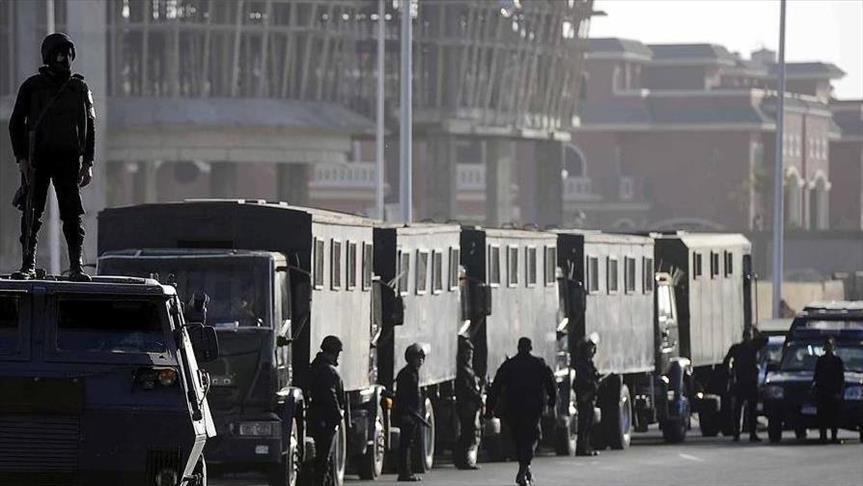Live Makkah
Live Madinah
Urdu Font Download
Latest News:
Padubidri: Fishing boat capsizes; all 7 fishermen on board rescued Alleged atrocity on lawyer: Punjalakatte SI suspended Moral policing at jewellery shop: 4 arrested Bajrang Dal activists try to assault youth, girlfriend in Mangaluru SC to hear Bilkis Bano’s plea against release of 11 convicts on 13 Dec Nusrat Noor: First Muslim Woman to Top Jharkhand Public Service Commission
Latest News:
Padubidri: Fishing boat capsizes; all 7 fishermen on board rescued Alleged atrocity on lawyer: Punjalakatte SI suspended Moral policing at jewellery shop: 4 arrested Bajrang Dal activists try to assault youth, girlfriend in Mangaluru SC to hear Bilkis Bano’s plea against release of 11 convicts on 13 Dec Nusrat Noor: First Muslim Woman to Top Jharkhand Public Service Commission
2011 Egypt uprising: From ‘Revolution’ to ‘Conspiracy’

ISTANBUL, 26 Jan 2019 [Fik/News Sources]: Eight years have passed since Egypt's January 25 popular uprising forced autocratic President Hosni Mubarak to step down after 30 years in power.
Although the uprising enjoyed a degree of constitutional recognition in 2012 and 2014, the official perception of Egypt’s 2011 “revolution” has changed markedly in recent years.
The country’s pro-regime mainstream media, meanwhile, continues to treat the subject with downright hostility.
On the uprising’s first anniversary in 2012, during a transitional phase led by Egypt’s Supreme Military Council, Field Marshal Mohamed Tantawi praised demonstrators’ demands for “bread, freedom and social justice”.
In 2013, Mohamed Morsi, Egypt's first democratically elected president and a Muslim Brotherhood leader, declared that the uprising had “achieved -- and will continue to achieve -- its goals”.
He went on, however, to warn the public of covert attempts to "steal" the uprising and subvert its goals.
On June 30, 2013, tens of thousands of people -- egged on by the media -- took part in anti-Morsi demonstrations, while Morsi’s followers hit the streets in support of the embattled president.
Three days later, the army ousted and imprisoned Morsi in a coup led by then Defense Minister Abdel-Fattah al-Sisi. The following year, al-Sisi was elected president.
On the uprising’s third anniversary in 2014, interim President Adly Mansour declared that the “revolution” against Morsi -- i.e., the mass demonstrations that preceded the coup -- had “brought the January 25 Revolution back on track”.
After assuming office in a questionable election, al-Sisi made a similar declaration one year later -- on the uprising’s fourth anniversary -- in which he said the protests that led to Morsi’s ouster had "corrected” the course of the January 25 uprising.
One year later still, on the uprising’s fifth anniversary, al-Sisi declared: “The June 30 revolution [against Morsi] came to restore the will of the people."
And on the uprising’s sixth anniversary, he said: "The January Revolution will remain a turning point in Egypt's history."
He added: “When the [January 25] Revolution strayed from its path and was coopted by narrow interests and non-national purposes, the people's revolution resumed in June 2013 to correct its course.”
And on the uprising’s seventh anniversary, al-Sisi hailed “the glorious Egyptian people on the anniversary of the revolution and their noble demands for freedom and dignity”.
Speaking to Anadolu Agency, Egyptian political analyst Mokhtar Ghobashi pointed out how official references to the January 25 uprising “reflect the agendas of whoever’s in power”.
“At each stage, the uprising has been referred to differently,” he said. “Each stage has seen the use of different language to refer to the event.”
“Meanwhile, the country’s pro-regime media continues to portray January 25 as a ‘mistake’ or ‘conspiracy’ and the reason behind all the country’s ills,” he added.
“As for the general public, people now usually refer to the 2011 uprising in whispers, while its symbols are seldom seen anymore,” said Ghobashi.
What’s more, unlike in his official speeches, al-Sisi has -- in televised statements and interviews -- frequently coupled his references to the 2011 uprising with what appear to be warnings.
In January of last year, for example, al-Sisi said in a televised address that Egypt would “never return to how things were seven or eight years ago”.
He went on to suggest that he might ask for a public "mandate" to confront what he described as “those who would tamper with Egypt’s security and stability”.
Last October, al-Sisi described the 2011 uprising as “the incorrect remedy” for the country’s problems.
Many leaders of the January 25 uprising, meanwhile, are (like Morsi) now in prison, including Ahmed Duma, Alaa Abdel-Fattah and the Muslim Brotherhood’s Mohamed al-Beltagy.
In December of last year, after years of hopping between prisons and hospitals, an aging Mubarak made an appearance -- as a witness -- at the trial of Morsi, who faces a host of trumped-up criminal charges.
During his testimony, Mubarak described the 2011 uprising that forced him to step down -- after 30 years in power -- as a "conspiracy".
Prayer Timings
| Fajr | فجر | |
| Dhuhr | الظهر | |
| Asr | أسر | |
| Maghrib | مغرب | |
| Isha | عشا |







